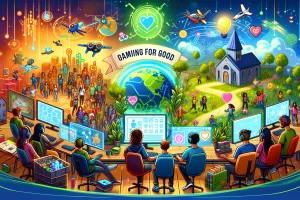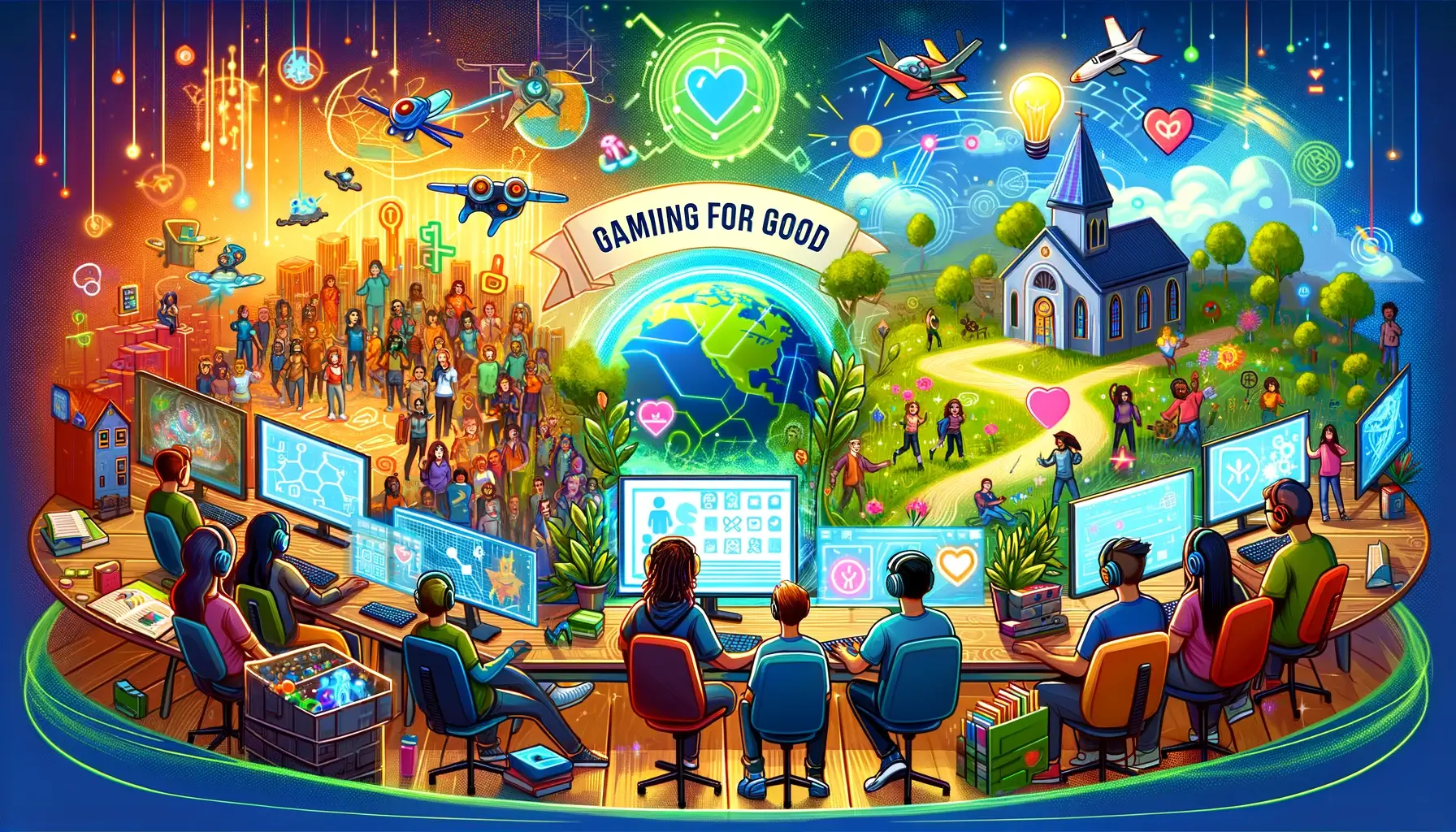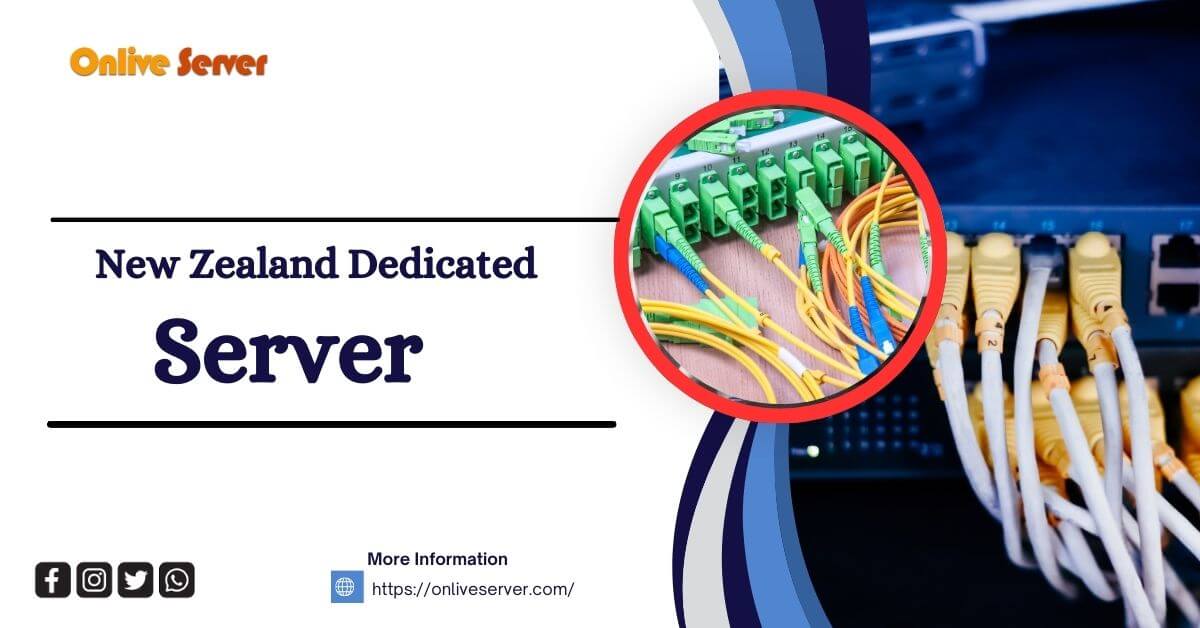Video games are often seen as a form of entertainment, but in recent years, they have become a powerful force for good in society. From education to mental health, charity events to environmental awareness, gaming has shown its potential to make a positive impact in various ways. The concept of “Gaming for Good” highlights how the gaming community is using its influence to bring about positive social, cultural, and environmental change. In this article, we will explore the diverse ways in which video games are contributing to a better world.
1. Video Games as Educational Tools
One of the most significant contributions of video games is in the field of education. Games are no longer just about entertainment; they are being used as tools to teach critical thinking, creativity, problem-solving, and even real-world skills. For example, Minecraft has been embraced by educators around the world to help students learn subjects such as math, history, and architecture. Through immersive gameplay and interactive challenges, players develop important cognitive skills that can be applied in real–life situations.
Furthermore, games like Kerbal Space Program and SimCity encourage players to understand complex concepts like physics, engineering, and city planning in a hands-on, engaging way. The ability to learn through play has revolutionized education, making learning more enjoyable and accessible. In this sense, gaming is not only changing the way people learn but also how they engage with education.
2. Raising Awareness for Important Causes
Another powerful way gaming is changing the world is by raising awareness for social, mental health, and environmental issues. Many video games feature narratives that tackle important topics, such as mental illness, poverty, and human rights. Hellblade: Senua’s Sacrifice is a prime example of a game that focuses on mental health, specifically schizophrenia. Through a deeply immersive and emotional experience, players gain insight into the challenges of living with a mental illness, which helps to reduce stigma and encourage conversations about mental health.
Games like This War of Mine provide a unique perspective on war by focusing on the struggles of civilians, fostering empathy and raising awareness about the impact of conflict on everyday people. Additionally, games like Eco and Planet Coaster promote environmental sustainability, encouraging players to create eco-friendly systems and develop an understanding of the delicate balance between human activity and nature.
These games don’t just entertain; they spark important discussions, educate players on critical issues, and challenge them to think about the world in new ways.
3. Gaming for Mental Health
In a world where mental health issues are becoming more prevalent, gaming has emerged as a source of relief for many individuals. Video games provide an accessible and engaging form of therapy for people experiencing anxiety, depression, or stress. Games like Stardew Valley offer players a calm, relaxing escape from the pressures of daily life, promoting mindfulness and helping reduce feelings of isolation.
Moreover, games like Sea of Solitude tackle complex themes like loneliness and self-worth, allowing players to reflect on their own emotional experiences while navigating the story. Many multiplayer games, such as World of Warcraft and Animal Crossing, create communities where players can connect with others, share experiences, and find support. The sense of belonging and camaraderie within these communities can significantly improve mental well-being.
Video game developers are also collaborating with mental health professionals to create therapeutic games designed to support mental health. Games that focus on relaxation, stress relief, and emotional exploration provide players with tools to cope with life’s challenges in a healthy, engaging way.
4. Charity Events and Fundraising
Gaming for good has become synonymous with charity work, thanks to the growing trend of charity gaming events and streams. Platforms like Twitch and YouTube have allowed gamers to raise money for causes they care about while doing what they love. Events like Games Done Quick and Extra Life bring together gamers from all over the world to raise millions for charities, such as Doctors Without Borders and Children’s Miracle Network Hospitals.
These events are not just about gaming; they are about uniting the gaming community to make a tangible impact on the world. Streamers and gamers alike participate in fundraising efforts, often playing games for hours or days on end to encourage donations. This collective effort demonstrates the power of gaming as a platform for charitable giving and social good.
Moreover, some video game developers also support charitable initiatives through in-game purchases or collaborations. For instance, Fortnite has hosted charity events where in-game skins and items were sold with proceeds going to various nonprofit organizations. This combination of gaming and philanthropy has proven to be an effective way to raise money for important causes.
5. Inclusive and Accessible Gaming
Inclusive gaming is an essential aspect of the gaming for good movement. The gaming industry has made significant strides in ensuring that games are accessible to players of all abilities. Adaptive controllers, such as the Xbox Adaptive Controller, allow gamers with physical disabilities to play games with ease. Additionally, many developers have introduced accessibility options, such as customizable controls, colorblind modes, and subtitles, making games more inclusive for a wider range of players.
Games like A Blind Legend, an audio-based game for visually impaired players, demonstrate how developers can create experiences that are inclusive of those with disabilities. By making gaming accessible to all, the industry is fostering a more inclusive and supportive community, where everyone can enjoy and participate in the gaming experience, regardless of their physical limitations.
6. Promoting Sustainability and Environmental Awareness
With the growing concerns over climate change, the gaming industry has begun to address environmental issues through gameplay and development practices. Games like Eco provide players with a platform to explore the concept of sustainability in a virtual world. Players are tasked with managing natural resources and building ecosystems while learning about ecological principles and environmental conservation.
In addition to in-game environmental education, many gaming companies are taking steps to reduce their carbon footprints. Developers are adopting greener practices in the production of games, such as reducing energy consumption in their data centers or switching to sustainable materials for physical game packaging. By integrating environmental themes into games and adopting more sustainable practices, the gaming industry is helping raise awareness and encourage action on climate change.
Conclusion: The Transformative Power of Gaming for Good
From education to charity, mental health to sustainability, video games have proven time and again that they are more than just a form of entertainment. Through creative and impactful initiatives, gaming has the potential to change the world for the better. As the gaming industry continues to innovate and expand, the possibilities for using games for good are endless. By harnessing the power of gaming, we can create a more compassionate, inclusive, and sustainable world, proving that gaming is not just for fun—it’s a tool for positive change.
If you have experiences or insights on gaming in your community, we invite you to share your story with us at write for us gaming!










